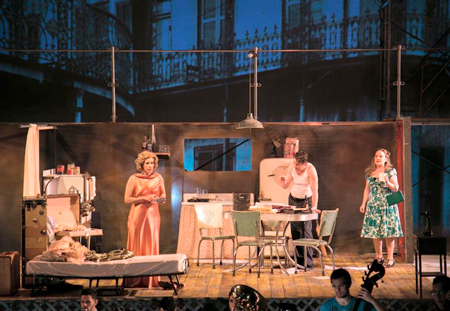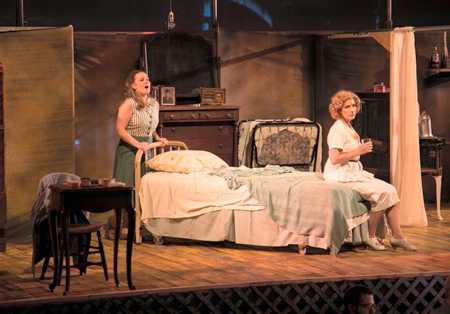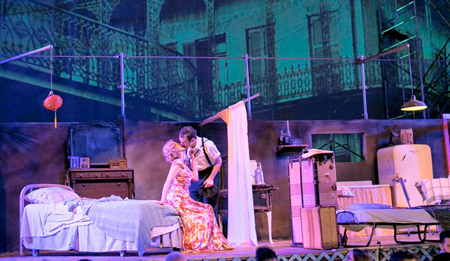by Daniel Hathaway

When Streetcar opened on Broadway in December of 1947, Jessica Tandy and Marlon Brando appeared as Blanche and Stanley (Williams had written Blanche’s role with Tallulah Bankhead in mind). When the iconic film was made in 1951, Vivian Leigh played opposite Brando. And when Previn and Littell’s opera debuted in San Francisco in 1998-1999, Blanche was sung by Renée Fleming.
Those are tough acts to follow, but on Friday, December 4, Cleveland Opera Theater’s resident cast of singers generally did themselves proud in a production imaginatively staged by artistic director Scott Skiba on a spacious (two-room!) set by Valentine Kozlenko topped off with evocative projections by Brittany Morenda. Period costumes, including Stanley’s iconic wife-beater shirts, were designed by Esther Haberlen. A second performance will take place on Sunday, December 6 at 3:00 pm.
Additional context was delightfully provided by the Zydeco Café in the lobby that served up such Bourbon Street fare as Poor Boys, Seafood Gumbo and Bread Pudding before the show and during intermissions. And the folks at Masonic let you take food and drinks into the auditorium — a nice lagniappe.
Playing Blanche, COT’s executive director Andrea Anelli was high-strung and vulnerable, a fine contrast to Benjamin Czarnota’s virile, sometimes brutish Stanley. Rebecca Freshwater created a strong, unflappable Stella, and Timothy Culver a sympathetic, socially awkward “Mitch” (Howard Mitchell). Strong secondary roles were sung and acted by Sandra Ross (Eunice Hubbell), Lucia Leszczuk (Mexican Woman and Nurse), Devon Turchan (A Young Collector), Jerry Tucker (Steve Hubbell), Charles Spencer (Doctor), and Robert Masseria (Pablo Gonzales).
Previn’s colorful, often rhythmically complex score, reflective of any number of 20th century musical styles from Puccini through Berg to jazz, was presented in a recent arrangement for chamber orchestra by Peter Grunberg, expertly conducted by Domenico Boyagian and played by an excellent 36-piece orchestra deployed on the floor in front of the thrust stage.
That physical arrangement brought Previn’s inspired orchestral colors into high profile while also creating some balance problems early in the opera. Female voices were at a particular disadvantage in the lengthy first act, but this largely took care of itself as the piece settled in. The composer underlined sensual scenes with jazz-inspired music — and a saxophone — and striking instrumental pairings like piccolo with tuba enlivened the score elsewhere. Bob Wachala’s lighting design provided additional colors, especially lurid ones when Stanley sexually assaulted Blanche in the third act.
Supertitles were useful, even if marred by multiple typos. Previn sets the text in parlando style, but in a counter-intuitive manner that often drags the lines out and makes them difficult to understand. It also makes the first act tediously long. Thankfully, Act II is short, and Act III is so full of action and tension that the show gathered momentum as the story unfolded. The playwright’s estate reportedly insisted that most of the original text of the play be included, so the usual thinning out of dialogue when a play is adapted for opera may have been impossible. It’s worth remembering that not every word of the originals ended up in Verdi’s Shakespeare operas.
In a striking departure from the main fabric of the opera, individual characters got free-standing arias during the piece, providing only a handful of opportunities for applause during the course of an act.
Scott Skiba deployed his singers efficiently and encouraged realistic interactions among them to the extent that the score allowed. The music of the strange, protracted rape scene in Act III inspired a dreamy frenzy of symbolic activity — a spinning bed with choreographed wrestling and writhing.
After 3½ hours, Previn and Littell’s opera ends with the line everyone had been waiting for. As the mentally-unbalanced Blanche is led offstage by a doctor and a nurse, she sings, “whoever you are — I have always depended on the kindness of strangers.” A big ovation from the small but appreciative crowd rewarded Cleveland Opera Theater for another complex and challenging project executed with professionalism and style.
Published on ClevelandClassical.com December 5, 2015.
Click here for a printable copy of this article




